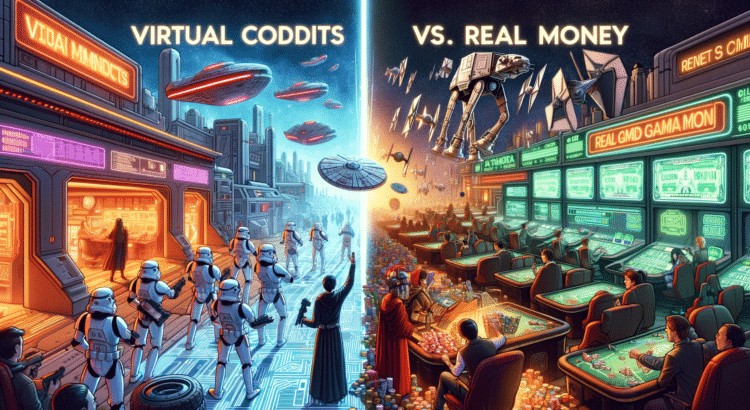The digital galaxies of Star Wars games are more than just epic battlegrounds; they are hubs of intricate in-game economies that increasingly reflect real-world financial and gambling dynamics. As these virtual economies evolve, they blur the lines between gaming and real-world monetary value, presenting unique opportunities and challenges. In this article, we will analyze various aspects of in-game economies, particularly focusing on Star Wars titles, and explore how they intersect with real-world gambling dynamics and the burgeoning world of cryptocurrency. Here’s what we’ll cover:
- Understanding In-Game Economies: An overview of how in-game economies function in Star Wars games, including the role of virtual credits.
- Real Money Transactions: Examining the impact of real money transactions in these games, and how they alter the gaming experience and player investment.
- Gambling Dynamics in Star Wars Games: Analyzing how elements like loot boxes in Star Wars games mirror real-world gambling, and the ethical considerations that arise from this.
- Introduction of Cryptocurrency: Exploring the emerging role of cryptocurrency in virtual economies and its implications for players and the gaming industry.
- Player Impact and Spending Habits: Discussing how in-game economies and real-money investments affect player behavior and spending habits.
- Regulatory and Ethical Considerations: Addressing the regulatory challenges and ethical dilemmas posed by these evolving virtual economies.
By delving into the intricate world of in-game currencies, real-money transactions, and the integration of cryptocurrency, this article aims to shed light on the increasingly complex nature of virtual economies in gaming. Star Wars games, with their vast fanbase and innovative gaming models, provide a perfect case study for understanding these dynamics and their broader implications.
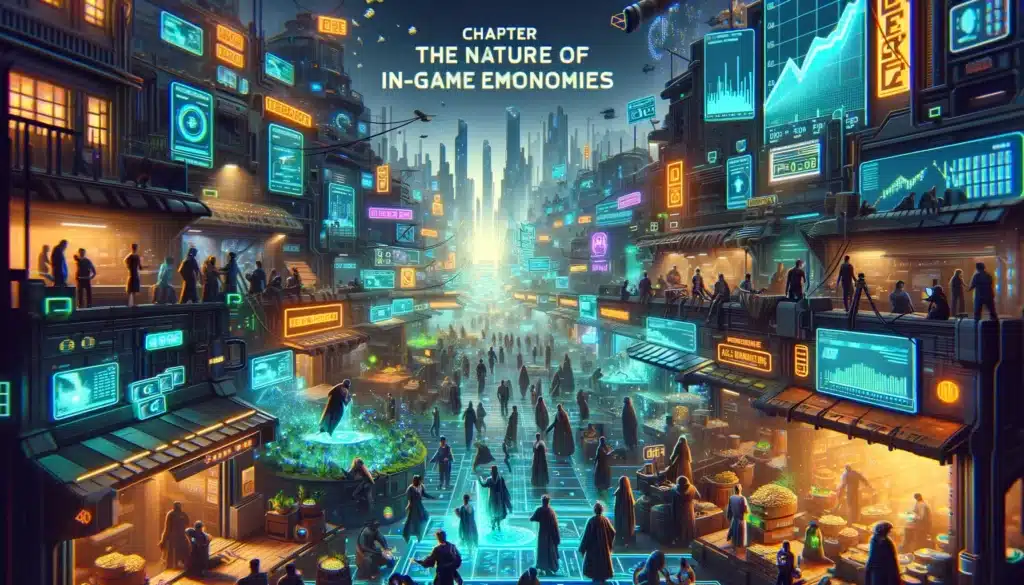
The Nature of In-Game Economies
In-game economies, particularly in the context of Star Wars games, represent a fascinating blend of virtual finance, gaming strategy, and real-world economic principles. These economies aren’t just background features; they play a crucial role in how players interact with the game, strategize, and ultimately derive enjoyment from their gaming experience. Let’s delve deeper into the various facets of these in-game economies:
- Virtual Credits System: At the heart of most Star Wars games is the virtual credits system. Players earn these credits through completing missions, achieving certain objectives, or even through periodic rewards. These credits function as the primary currency within the game, allowing players to purchase items, upgrades, or new abilities. This system encourages players to engage more deeply with the game, strategizing on how to earn and spend these credits most effectively.
- Economy of Scarcity and Reward: Many games create an economy of scarcity, where certain items or abilities are hard to come by. This scarcity adds value to the items and makes the process of acquiring them more rewarding. Players may need to invest significant time and effort into earning enough credits to obtain these items, mirroring real-world economic dynamics of supply and demand.
- Balancing the Economy: Game developers face the challenge of balancing this virtual economy. If credits are too easy to earn, it diminishes the value of items and can lead to inflation within the game. Conversely, making them too hard to earn can lead to player frustration and disengagement. Finding the right balance is crucial for maintaining an engaging and sustainable in-game economy.
- Real Money Integration: The introduction of real money transactions adds a complex layer to these economies. Players can bypass some of the time and effort required to earn virtual credits by purchasing them with real money. This integration can have a significant impact on the game’s economic balance and player dynamics, as those willing to spend real money can gain a faster or more significant advantage.
- Psychological Elements: The in-game economies also tap into various psychological elements. The satisfaction of earning credits, the anticipation of purchasing new items, and the strategy involved in managing resources all contribute to the player’s psychological engagement with the game. This engagement is crucial for the game’s long-term success and player retention.
- Economic Strategies and Learning: Interestingly, these virtual economies can also serve as platforms for learning basic economic principles such as resource management, investment strategies, and risk assessment. Players often subconsciously apply economic reasoning and decision-making skills as they navigate these in-game financial systems.
- Community and Market Dynamics: In some games, the economy extends beyond individual players to encompass a broader community or market system, where players can trade items or resources. This aspect introduces market dynamics such as price setting, bidding, and negotiation, further mirroring real-world economic interactions.
In summary, the nature of in-game economies in Star Wars games is multifaceted and complex. These virtual financial systems not only enhance the gaming experience but also incorporate elements of strategy, psychology, and real-world economic principles. Understanding these in-game economies offers insights into both the allure of gaming and the intricate ways in which virtual and real-world finances can intersect.
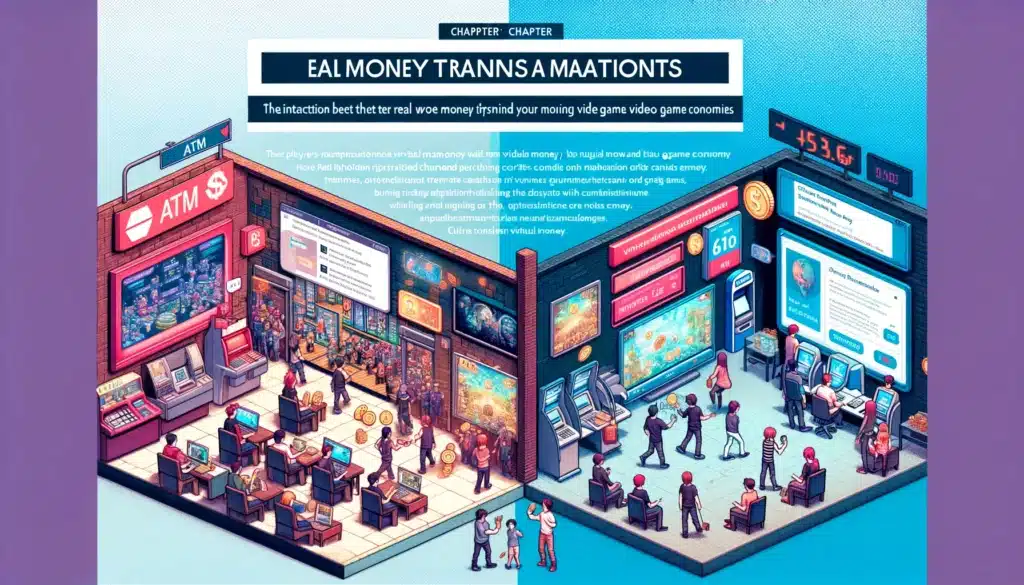
Real Money Transactions
Real Money Transactions (RMT) in video games, particularly in Star Wars titles, represent a significant evolution in in-game economies. RMT allows players to use actual currency to purchase virtual items or currency, a feature that has both enhanced and complicated the gaming experience. To fully grasp the impact of RMT, it’s essential to explore various aspects of this phenomenon:
- Direct Purchase of In-Game Currency: In many Star Wars games, players have the option to buy virtual credits with real money. This feature is often designed for players who wish to accelerate their progress or access certain content more quickly. While convenient, it introduces a disparity between players who can afford to spend real money and those who can’t.
- Loot Boxes and Randomized Rewards: A common form of RMT in Star Wars games is the purchase of loot boxes, which offer random rewards. The chance element of these boxes can be likened to gambling, as players spend real money without a guaranteed return on value. This has been a contentious issue, raising concerns about potential gambling addiction and the impact on younger players.
- Impact on Game Balance and Fair Play: RMT can significantly impact game balance and the notion of fair play. Games that offer powerful items or advantages through RMT can lead to a ‘pay-to-win’ scenario, where financial investment outweighs skill or game knowledge. This can lead to frustration among players who feel they cannot compete without spending money.
- Economic Accessibility and Player Choice: RMT introduces questions about economic accessibility and player choice. While it offers an alternative for players who might not have the time to invest in earning credits through gameplay, it also creates a virtual economy where financial power can translate into in-game advantages.
- Regulatory and Ethical Considerations: The integration of RMT in games has drawn attention from regulators, particularly concerning loot boxes. This has led to discussions about age restrictions, disclosure of odds, and other consumer protection measures. Ethically, game developers must navigate how to implement RMT without compromising the integrity and fairness of the game.
- Player Spending and Microtransactions: RMT has led to the prevalence of microtransactions in gaming. While these can provide a steady revenue stream for developers, they also risk alienating players who might view them as intrusive or exploitative, especially when they feel pressured to spend money to enjoy the game fully.
- Community Response and Feedback: The gaming community’s response to RMT is varied. Some players appreciate the option to advance more quickly, while others criticize it for undermining the gaming experience. Community feedback has been crucial in prompting developers to modify or balance RMT features.
- The Role of RMT in Game Design: The potential revenue from RMT has influenced game design, with developers creating content specifically geared towards encouraging real money purchases. This shift has implications for how games are designed and what content is prioritized.
In conclusion, Real Money Transactions in Star Wars games and the broader gaming world represent a complex aspect of modern gaming economics. While offering benefits like accessibility and choice, they also introduce challenges regarding fairness, ethical gaming practices, and the potential for gambling-like behavior. As the gaming industry continues to evolve, the role and impact of RMT remain crucial areas for ongoing discussion and careful consideration.

Star Wars Games and Gambling Dynamics
The introduction of gambling dynamics in Star Wars games, particularly through mechanics like loot boxes, has sparked significant debate and concern. These elements, while adding an element of excitement and unpredictability, also mirror gambling behaviors, raising questions about their impact on players, especially younger audiences. Let’s delve deeper into the various aspects of these gambling dynamics within Star Wars games:
- Loot Boxes and the Thrill of Chance: Central to the gambling-like experience in many Star Wars games is the presence of loot boxes. These digital crates, which players can open to receive random items, create a sense of anticipation akin to gambling. The uncertainty and thrill of possibly receiving a rare item mimic the psychological triggers associated with traditional gambling.
- Monetization of Chance: The ability to purchase loot boxes with real money adds another layer to this dynamic. Players are not just risking in-game currency but actual financial resources, blurring the lines between virtual gaming and real-world gambling. This monetization of chance can potentially lead to problematic gaming habits, where the desire to obtain rare items encourages repeated spending.
- ‘Pay-to-Win’ Mechanics: Some Star Wars games have been criticized for their ‘pay-to-win’ mechanics, where players can gain significant advantages by purchasing loot boxes. This not only parallels gambling dynamics but also raises issues of game fairness and balance, as it can create uneven playing fields between players who spend real money and those who do not.
- Regulatory Scrutiny and Response: The gambling-like aspects of these games have not gone unnoticed by regulators. In some jurisdictions, loot boxes have led to investigations and calls for regulation under gambling laws. This has forced game developers to reconsider the design and implementation of such features in their games.
- Ethical and Social Concerns: Beyond regulation, there is an ongoing ethical debate regarding the incorporation of gambling-like mechanics in games. Concerns include the potential for addiction, the impact on children and vulnerable players, and the responsibility of game developers to protect their players from harm.
- Community Feedback and Developer Adjustments: The gaming community has been vocal about its concerns regarding these gambling dynamics. In response, developers, including those of Star Wars titles, have had to make adjustments, such as removing or redesigning loot box systems, to address these concerns and avoid backlash.
- Impact on Player Experience and Game Reputation: The introduction of gambling dynamics has had a notable impact on the player experience and the overall reputation of certain Star Wars games. While it can add excitement for some, for others, it has led to distrust and dissatisfaction with the game developers and publishers.
- Educational Aspect and Awareness: This situation has also had an educational effect, raising awareness among players, parents, and educators about the potential risks associated with in-game gambling. It has sparked discussions about digital literacy, responsible gaming, and the need for informed decision-making when engaging with such game mechanics.
In summary, the gambling dynamics in Star Wars games reflect a complex interplay between player psychology, game design, and ethical considerations. As the gaming industry continues to evolve, so too does the conversation around these dynamics, underscoring the need for a balanced approach that respects both the enjoyment of gaming and the well-being of its players.
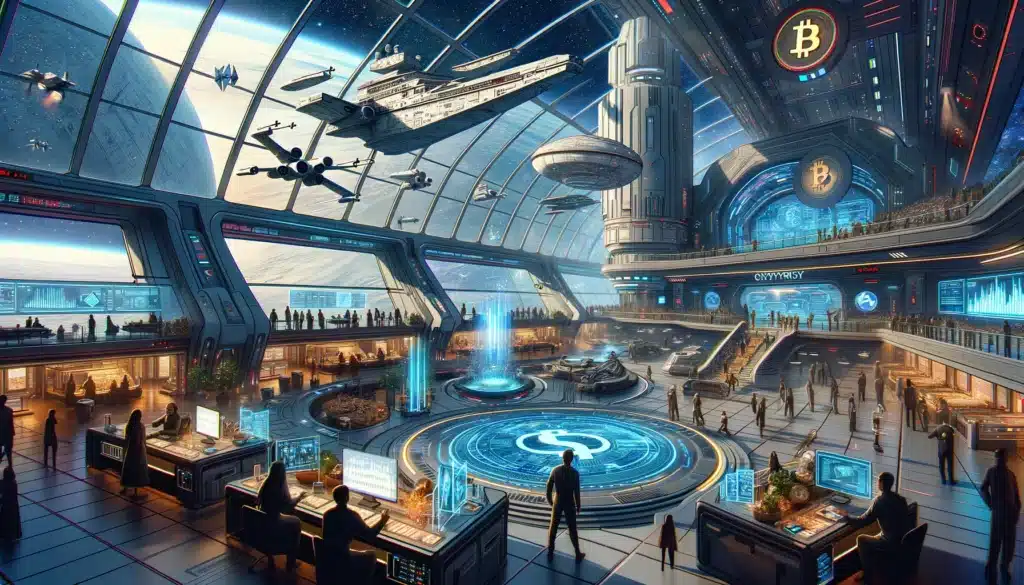
Cryptocurrency’s Emerging Role
The inclusion of gambling-like mechanics in Star Wars games, such as the use of loot boxes and real money transactions, has significant implications for players. These features not only affect gameplay but also raise several ethical considerations regarding player welfare and game design. Expanding upon these aspects provides a clearer understanding of their broader impact:
- Player Spending Habits: The primary concern revolves around how these in-game features influence player spending. The temptation to spend real money for in-game advantages or rare items can lead to excessive spending. For younger players or those susceptible to addictive behaviors, this poses a particular risk, as they might not have the same level of self-regulation or financial responsibility.
- Psychological Effects of Gambling Mechanics: The psychological impact of gambling-like mechanics cannot be understated. The thrill of opening a loot box, the anticipation of the rewards, and the disappointment of not getting desired items can trigger a cycle similar to gambling addiction. This can lead to players spending more money in pursuit of that elusive ‘win’, akin to chasing losses in gambling.
- Fairness and Player Equality: Another ethical consideration is the issue of fairness and equality among players. When game progress or success can be significantly influenced by real money purchases, it creates an uneven playing field. This can diminish the gaming experience for those who choose not to or cannot afford to spend additional money.
- Targeting Vulnerable Players: Games with these mechanics may inadvertently or deliberately target vulnerable players. This includes children and those predisposed to addictive behaviors. Ethically, game developers and publishers have a responsibility to protect these groups from potential harm caused by gambling-like game features.
- Transparency and Informed Consent: Ethical game design also involves transparency about the odds of receiving items from loot boxes and the true cost of participation. Players should be able to make informed decisions about their spending in games, which necessitates clear and honest communication from game developers.
- Regulatory Compliance and Self-Regulation: Developers must navigate the complex web of international regulations regarding in-game purchases and gambling mechanics. Ethical considerations also extend to self-regulation, where developers must balance profitability with responsible gaming practices.
- Parental and Guardian Awareness: The role of parents and guardians becomes crucial in this context. They need to be aware of the nature of these games, the potential risks associated with in-game spending, and the tools available to monitor or restrict such activities for younger players.
- Community Trust and Game Longevity: The trust and loyalty of the gaming community are vital for the longevity of any game. Ethical missteps, particularly in terms of in-game monetization, can lead to a loss of trust and a decline in the player base, which can be detrimental to the game’s success in the long term.
- Mental Health Considerations: There’s growing concern about the impact of gaming, particularly games with gambling-like elements, on mental health. Ensuring that games provide a healthy and enjoyable experience without contributing to stress, anxiety, or addictive behaviors is an important ethical consideration for developers.
In conclusion, the player impact and ethical considerations surrounding gambling-like mechanics in Star Wars games and the broader gaming industry are multifaceted and significant. Balancing the commercial interests of game development with the well-being and enjoyment of players presents ongoing challenges that require careful thought, responsible design, and a commitment to ethical standards.
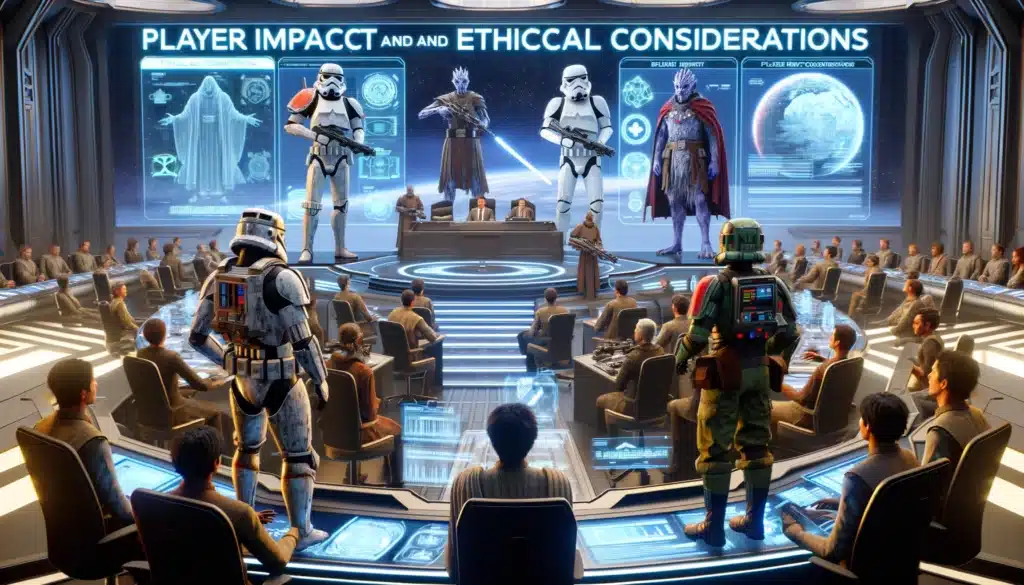
Player Impact and Ethical Considerations
The integration of gambling-like mechanics in Star Wars games, such as loot boxes and real money transactions, significantly impacts players both in terms of their gaming experience and broader ethical implications. Expanding on these aspects offers a deeper understanding of their complex nature:
- Influence on Player Behavior: In-game gambling mechanics can significantly influence player behavior. The allure of winning rare items or gaining advantages can lead to repeated spending and extended play sessions. This behavior is particularly concerning in younger or more vulnerable players who may be more susceptible to developing addictive habits.
- Financial Implications for Players: There’s a real financial impact on players who engage in these systems. The cost of microtransactions can accumulate quickly, leading to spending more than intended. This poses a risk of financial strain, especially for those who might not have the means to sustain such spending.
- Social and Peer Pressure: Social dynamics in gaming communities can add pressure to participate in microtransaction systems. Players might feel the need to keep up with peers who have access to premium items or status, leading to spending beyond their comfort levels.
- Perception of Value and Reward: The way players perceive value and reward in these games is altered by the presence of gambling-like mechanics. The random nature of loot boxes can create a disconnect between effort, skill, and reward, potentially diminishing the satisfaction derived from gameplay.
- Ethical Responsibility of Developers: Game developers and publishers face ethical responsibilities in how they implement these systems. This includes ensuring fairness, being transparent about the odds and costs, and protecting players from potential harm caused by these mechanics.
- Impact on Mental Health: The psychological effects of gambling-like mechanics in games can extend to mental health concerns. The highs and lows associated with winning and losing, combined with the potential for addictive behaviors, can have lasting impacts on a player’s mental well-being.
- Regulatory and Legal Challenges: Navigating the legal and regulatory landscape poses ethical challenges for game developers. Ensuring compliance with diverse international laws while maintaining ethical practices requires a delicate balance.
- Educational Responsibilities: There is a growing need for education around these gaming mechanics. Players, parents, and educators should be informed about the nature of these systems, their potential risks, and how to engage with them responsibly.
- Long-Term Player Engagement: Ethical considerations also extend to how these mechanics affect long-term player engagement. While they may provide short-term financial gains for developers, they can lead to player burnout and disengagement in the long run if not managed responsibly.
- Creating Healthy Gaming Environments: Beyond the immediate game mechanics, there’s an ethical imperative to foster healthy gaming environments. This includes promoting balanced gameplay, encouraging breaks, and providing resources for players who might need support.
In summary, the player impact and ethical considerations associated with gambling-like mechanics in Star Wars games are extensive and multifaceted. They encompass a range of issues from psychological impacts and financial implications to broader concerns about responsible gaming and community well-being. Addressing these concerns requires a concerted effort from game developers, players, regulators, and the gaming community as a whole.
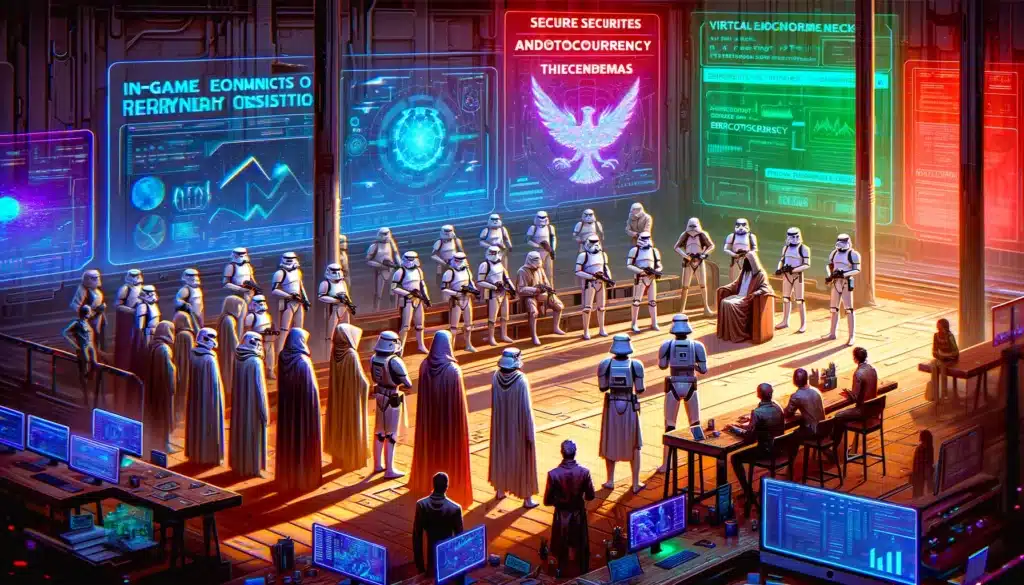
Conclusion
As we’ve explored the complex terrain of in-game economies, particularly in the context of Star Wars games, it’s evident that the convergence of virtual and real-world financial dynamics, coupled with gambling-like mechanics, presents a multifaceted challenge. These elements, while enhancing gameplay and offering new experiences, also bring forth significant ethical considerations and impacts on players. In extending our conclusion, let’s reflect on the broader implications and the path forward.
- Balancing Engagement with Responsibility: The primary challenge for game developers is balancing the need to create engaging and financially viable games with the responsibility to protect and respect the players. This involves ethical monetization strategies, transparent communication about in-game purchases, and a commitment to fair play.
- Need for Continuous Dialogue: As the gaming industry evolves, so too should the conversation around in-game economies and gambling-like elements. This dialogue must include developers, players, regulators, and mental health professionals, ensuring that a diverse range of perspectives are considered in shaping the future of gaming.
- Regulatory Evolution: The regulatory landscape surrounding in-game economies and gambling mechanics is in flux, and it needs to evolve continually to keep pace with technological advancements and changing player dynamics. This evolution should aim at protecting vulnerable players while allowing for innovation and growth in the gaming industry.
- Educating Players and Communities: There’s a growing need for education about the risks and realities of in-game economies. Players, especially younger ones, need to be equipped with the knowledge to make informed decisions about in-game spending. Parents and educators also play a crucial role in this educational process.
- The Role of Technology in Monitoring and Regulation: Advancements in technology could provide tools for better monitoring and regulation of in-game economies. AI and data analytics, for instance, could be used to identify and mitigate problematic gaming behaviors, helping to create safer gaming environments.
- Promoting Ethical Game Design: The future of gaming should be anchored in ethical game design principles. This involves designing games that are enjoyable and engaging without relying excessively on monetization mechanics that resemble gambling.
- Mental Health Awareness and Support: Acknowledging and addressing the mental health aspects of gaming is crucial. Providing resources and support for players who might be affected by these in-game elements is an important step towards responsible gaming.
- Future Research and Studies: Ongoing research and studies are essential to understand the long-term effects of in-game economies and gambling-like mechanics. This research can inform better game design practices, regulatory policies, and player support systems.
In conclusion, the intersection of in-game economies with real money transactions and gambling dynamics, especially in popular franchises like Star Wars, is a nuanced and evolving issue. It presents challenges and opportunities for the gaming industry, requiring a collaborative and proactive approach to ensure that games remain enjoyable, fair, and responsible. As we move forward, the focus should be on creating gaming experiences that respect player autonomy and welfare, while continuing to innovate and entertain.
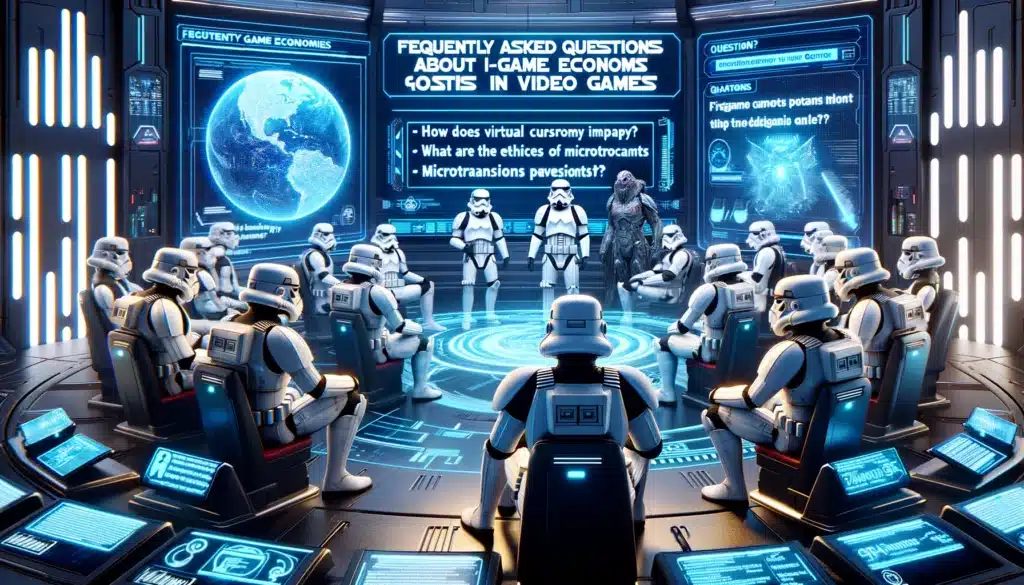
Frequently Asked Questions about In-Game Economies in Star Wars Games
- What are in-game economies in Star Wars games? In-game economies refer to the systems within Star Wars games where players earn, spend, and manage virtual currencies and items, often influenced by real-world financial dynamics.
- How do real money transactions work in these games? Real money transactions allow players to purchase virtual credits or items using actual currency, often providing quicker access to game content or advantages.
- Are there gambling elements in Star Wars games? Some Star Wars games include gambling-like elements, such as loot boxes, where players spend virtual or real currency for a chance to win random in-game items.
- Is it ethical to have gambling mechanics in video games? The ethics of gambling mechanics in video games are debated, particularly regarding their impact on younger players and potential to encourage gambling behavior.
- Do these games encourage real-world spending? Certain features in these games, like loot boxes or premium content, can encourage players to spend real money to enhance their gaming experience.
- How do in-game economies affect players? In-game economies can impact player behavior, spending habits, and overall game enjoyment. They may also lead to competitive imbalances or encourage excessive spending.
- Are there regulations for these types of in-game systems? Regulations vary by region, with some countries imposing strict rules on in-game gambling elements and real money transactions to protect consumers, especially minors.
- Can in-game spending lead to addiction? Like any form of expenditure on entertainment, in-game spending can become problematic if not managed responsibly, potentially leading to addictive behaviors in some players.
- How can players manage spending in these games? Players can manage spending by setting budget limits, being aware of the true costs of in-game purchases, and understanding the odds of winning items from loot boxes.
- What is the future of in-game economies in Star Wars games? The future of in-game economies will likely involve a balance between providing engaging content and ensuring ethical and fair practices, influenced by player feedback and regulatory changes.


